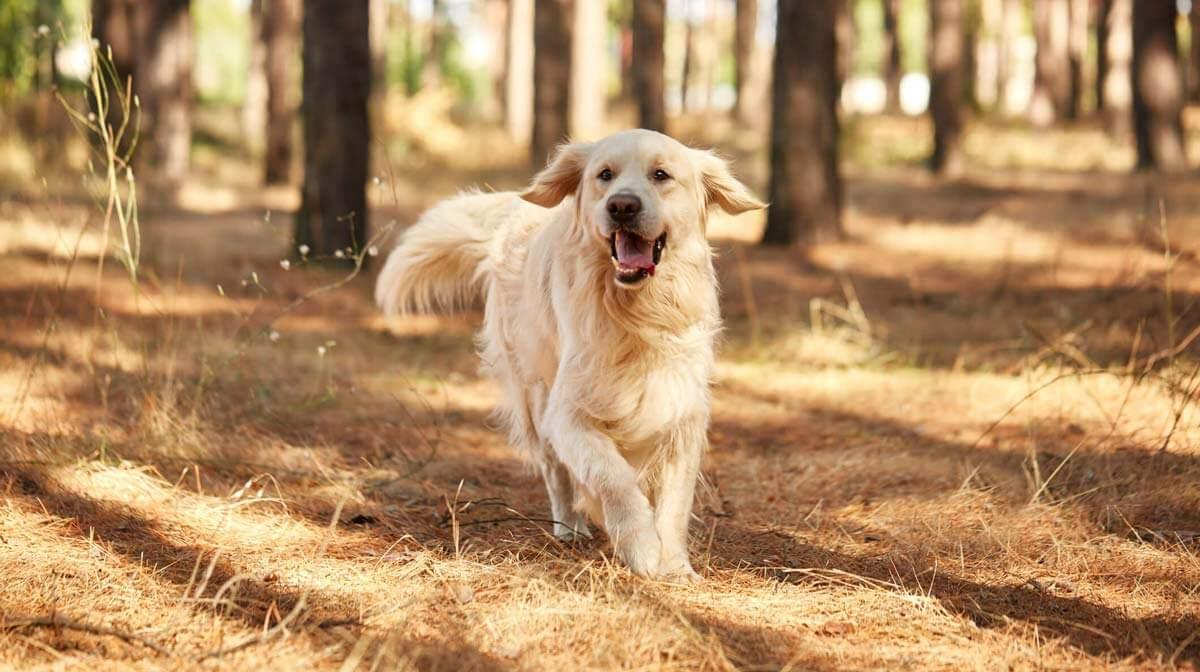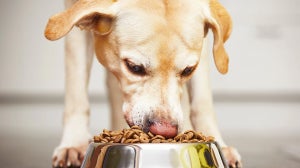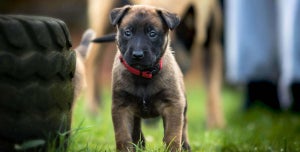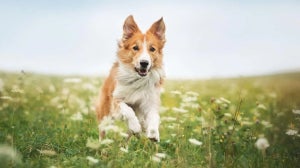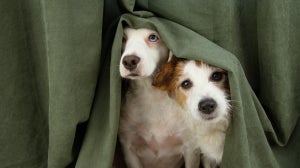
Contrary to popular belief, dogs are omnivores and are therefore able to digest carbohydrates.
Before dogs became domesticated, they ate mainly meat – prey such as mice, rabbits or birds – as well as fruits, vegetables or grasses. Today, most dogs eat either dry food, wet food, or a mixture of both, which is usually made from meat, gravy, vegetables and grains such as wheat, rye and barley, among other ingredients. However, thanks to an improved knowledge of our dogs’ nutritional needs, what we feed our pets is ever-evolving.
More people than ever are choosing to feed their pets a grain free diet for the health benefits it offers, and also to avoid the possible risk of grain intolerance, which can cause distress for both dog and owner. Grain free dog food is made without using cereals, which are instead replaced with vegetables such as carrot and potato. Although dogs can easily eat and digest grains, grain free dog food can be beneficial for many reasons.
Many James Wellbeloved customers have discovered that their dogs actually prefer grain free dog food and find it tastier. So, why should you feed your dog James Wellbeloved Grain Free food? Read on to discover more…
Food intolerances in dogs
Just like humans, dogs can also have allergies and intolerances to certain foods, including beef, milk and dairy. They can also have an intolerance to grains, although this is very uncommon.
Signs that your pup may have a food intolerance include:
Vomiting
Coughing
Inflamed or itchy skin
Digestive problems such as flatulence
Hair loss
If your dog exhibits any of these symptoms, it’s vital that you ask an expert for a diagnosis. If confirmed as a food allergy or intolerance, you will need to make changes to your dog’s diet. A vet can recommend the best food to suit your dog’s particular allergy or intolerance.
Food allergies can present themselves at any age – some dogs even develop them after years of having no problems at all. Some breeds are more susceptible to food intolerances, including Cocker Spaniels, Irish Setters, German Shepherds and West Highland Terriers. The best way to treat a food intolerance is to make sure your dog does not eat food that contains the problem ingredient.

Benefits Of James Wellbeloved Grain Free Dog Food
James Wellbeloved promotes the importance of using natural ingredients in dog food, carefully selected for your canine companion’s health and wellbeing.
All our dog food is naturally hypoallergenic, with no synthetic colours, flavours or preservatives and is bursting with powerful natural antioxidants. It contains no beef, pork, soya, wheat, dairy, or eggs. Happy customers have even reported that James Wellbeloved dog food is great for fussy eaters!
James Wellbeloved also recognises the importance of providing different food for small and large dogs and dogs at different stages of life. Our selection of dry and wet dog food comes in a range of flavours, including fish and turkey, and in both grain free and rice options, with all the vitamins and minerals your dog needs.
If you’re thinking of switching your pup to a grain free diet, James Wellbeloved is a fantastic option for you. Read on to discover even more benefits that this type of dog food offers.
Healthy coat
One of the most obvious signs of a healthy dog is a shiny, glossy coat. James Wellbeloved Grain Free dog food contains Omega 3 and Omega 6 fatty acids, as well as fats from sunflower, linseed and fish oils to ensure your dog’s coat is as healthy as possible. These fatty acids are also present in all James Wellbeloved food.
Healthy digestive system
As many owners will know, when your dog’s digestive system is upset, it can be unpleasant. For this reason, James Wellbeloved pack their grain free dog food with yucca extract (for firmer, less smelly stools), prebiotics and chicory inulin (to help maintain healthy, happy gut flora), and a balanced amount of functional fibres (for a happy, settled tummy and digestive system).
These ingredients are also present in all James Wellbeloved food too. For smaller breeds, cranberry extract is included in James Wellbeloved Small Breed Grain Free food to support urinary health.
Heart and joints
There has been speculation recently that grain free diets may contribute to canine heart conditions, and this can sometimes be rectified by increasing the level of taurine. Taurine has many functions, including strengthening heart muscle and preventing muscle degeneration and can be found in meat and dairy, but not in grains or legumes.
James Wellbeloved Grain Free dog foods are not legume based; instead they contain a mixture of potatoes and peas instead of grains. To keep your dog’s heart healthy, James Wellbeloved Grain Free dog food contains a blend of taurine, glucosamine, chondroitin and herbs which work together to protect your dog’s heart and joints.
Healthy teeth
James Wellbeloved Small Breed Grain Free food contains green tea, with antibacterial properties that support good dental health, so your pup can continue to enjoy strong, healthy teeth.
Grain free dog treats
When you want to treat your dog to reward good behaviour or as an afternoon snack, James Wellbeloved also offer tasty grain free dog treats. These treats are naturally hypoallergenic and use tomato flesh and skin which provide energy, natural pectins, and the antioxidant lycopene for a delicious, natural and healthy treat. Thanks to the numerous benefits of the fresh and healthy natural ingredients in James Wellbeloved Grain Free dog food, it will keep your four-legged friend happy and healthy, with the energy to run, jump and play as much as they want.
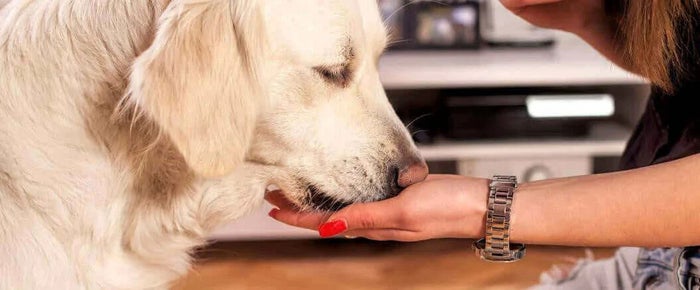
Tips for going Grain Free
If you’re considering transitioning your dog onto a grain free diet, we have some top tips to help you make the switch. Whenever you make changes to your dog’s diet, it’s important to consult a vet first. They will be able to give you information and advice on what will best suit your dog according to their age, breed, health records and size, and how much to feed them. For example, if you are thinking about giving your puppy grain free food, they may need a different diet to an adult or senior dog.
When changing your dog’s food, you should always introduce the new food gradually, giving your pet plenty of time to adjust and reduce the chances of your pet getting an upset stomach. If your pet is a fussy eater, a gradual transition should increase the likelihood that they will accept the new food. During the food transition, keep a close eye on your pet for any changes in behaviour or health and contact a vet if you have any concerns.
Alternatives to grain free food
James Wellbeloved also offer delicious dog food combining fish, turkey, duck, or lamb with rice, which is known for being gentle on the digestive system. These diets offer many of the same benefits as grain free dog food.
If you need advice on how much to feed your dog, there is a handy guide on the website which offers advice depending on size, level of activity, weight and age.
All James Wellbeloved dog food is high quality, packed with essential vitamins and minerals, and highly digestible, so no matter which diet you choose for your dog, you can be sure that they will be enjoying tasty, protein-rich food that will keep them healthy and energised.
How to choose dog food
If you’re considering moving your dog to a new dog food, including grain free, it can be difficult to know where to start. To make sure your pup gets the best nutrition possible, here are a few handy tips on how to choose a good quality dog food.
First, you’re going to want to consider your dog’s breed, age, size and activity level. This can make all the difference when selecting dog food. For example, smaller dogs have smaller stomachs than larger breeds, which means that small dogs can physically manage much less food than large dogs. For this reason, small breed diets are more energy dense than large breed diets. We also make smaller kibble to suit smaller mouths, and larger kibble to slow down big dogs!
Next, do your research. Where do the ingredients come from? How are they processed? What is the quality of the ingredients used – in particular the meat? The wording on dog food labels determines how much of the ingredient is used and where it comes from, which is always useful to know.
Above all, pay attention to your dog’s preferences – at the end of the day, you want to make sure they are enjoying their food! If your dog turns his or her nose up at a certain food, try a different one – or try feeding our James Wellbeloved wet pouches as a tasty topper. If you choose to feed wet and dry remember to reduce the quantity of dry food fed – and have a look at our dog feeding guide to get an idea.
So, if you’d like to switch your dog to a grain free diet, James Wellbeloved is a fantastic choice. You can rest easy in the knowledge that all ingredients in James Wellbeloved Grain Free food have been carefully sourced and cooked to ensure complete and balanced nutrition for your dog, keeping their coat, heart, teeth and joints in top condition.
When making the transition to a grain free diet, always be sure to consult a vet first and to keep an eye on your dog, ensuring that they are healthy and happy.

